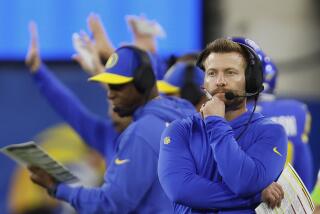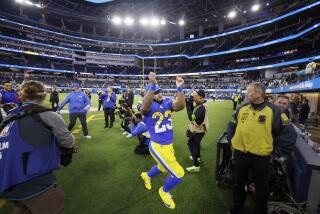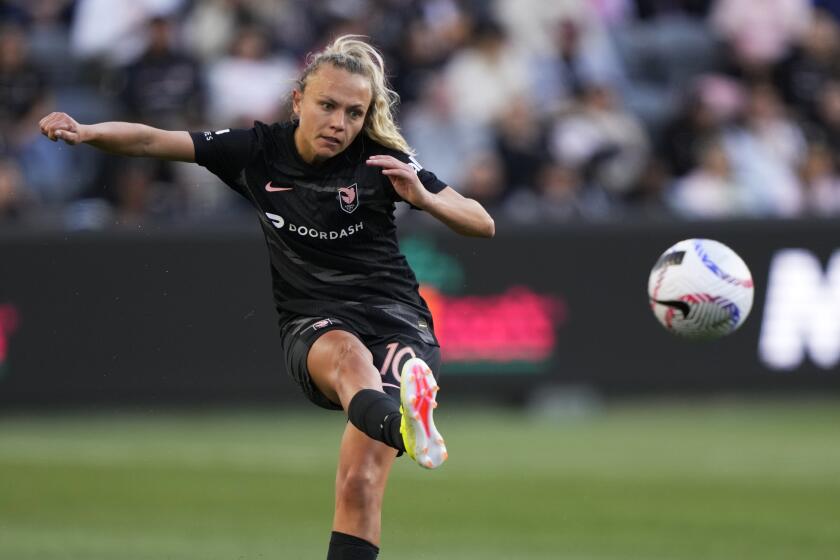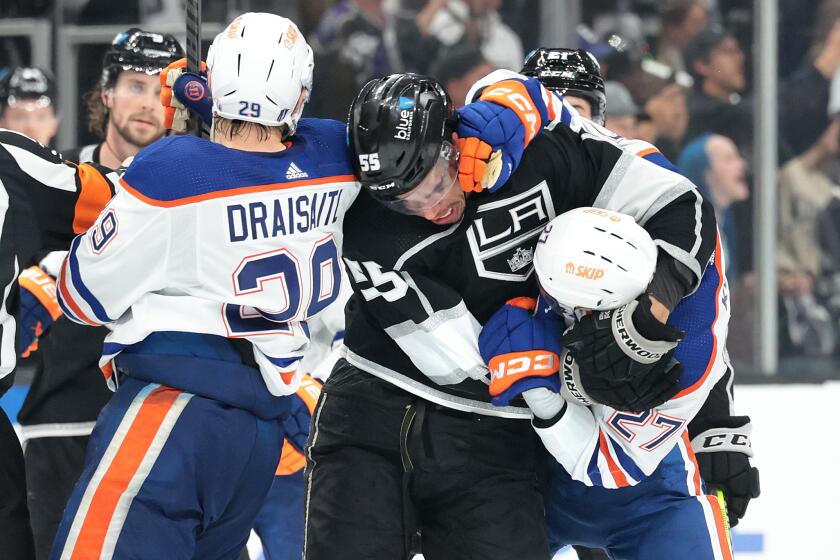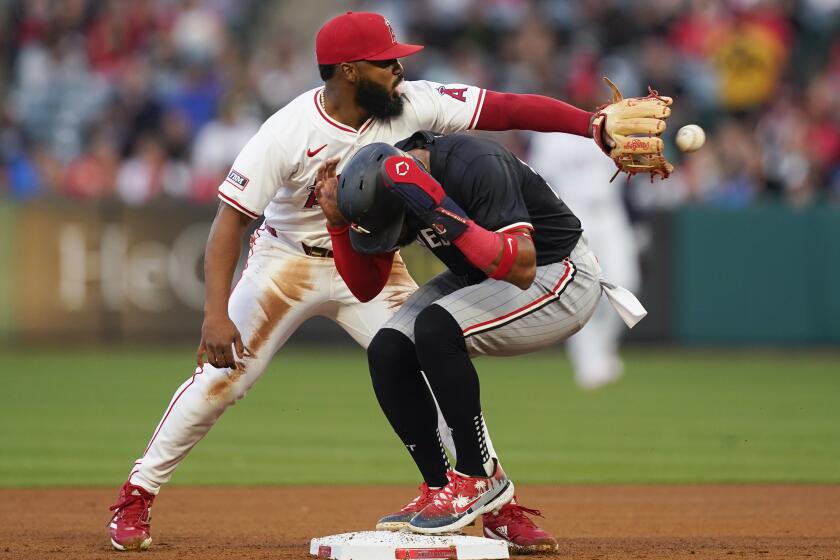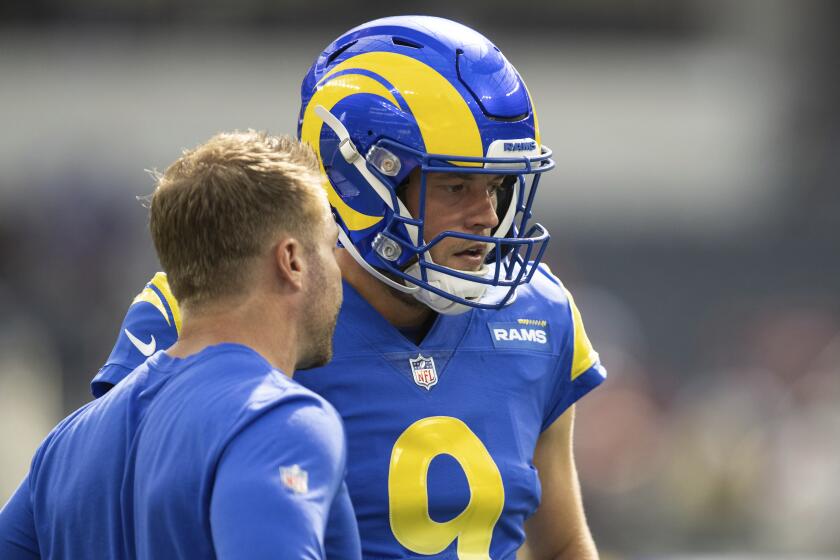Now it’s Saints who should absorb a knockout blow
I’ll never forget the sight of Brett Favre stumbling down a Superdome hallway, welts on his neck, fog in his eyes, his career essentially ended after a blatant mugging by the New Orleans Saints.
“I wonder if I can hold up, especially after a day like today,” he said after his Minnesota Vikings were beaten in the NFC championship game two years ago.
At the time, we thought we were watching tough football. Turns out, we were witnessing sanctioned evil.
I’ll never forget the sight, eight days earlier, of Kurt Warner lying flat on his back, motionless and mumbling into space, his career basically cooked after absorbing a furious sucker punch from the Saints’ Bobby McCray.
“He hit me pretty good,” Warner said after his Arizona Cardinals were beaten in the playoffs after the 2009 season. “You get that initial wind knocked out of you there and you kind of panic. You can’t move. You can’t breathe.”
At the time, we thought we were watching a clean hit. Turns out, we were watching a hired assault.
The integrity of this country’s most popular sports league has been battered, and its commitment to safety bloodied, with the NFL’s report Friday that the New Orleans Saints spent three years operating a management-approved bounty pool that paid big money for inflicting injury.
It is a revelation that should hit the public’s sensibilities like that knucklehead hit Warner. Disbelief won’t move, and disgust can’t breathe.
A league investigation showed that, under the leadership of defensive coordinator Gregg Williams and with the knowledge of Coach Sean Payton and General Manager Mickey Loomis, the Saints were paid money for jeopardizing lives.
The league said that between 22 and 27 players participated in a pool of as much as $50,000 that paid out money for game-ending injuries. If you knocked a player out, you were paid $1,500. If you inflicted an injury that caused a player to be carted off the field — a “cart-off,” it was sickeningly called — you were paid $1,000. The bounties doubled or tripled during the playoffs.
And, yes, two of the players targeted in the program were Brett Favre and Kurt Warner.
According to the report, Saints owner Tom Benson was told about the allegations earlier this year, ordered it stopped, but Loomis ignored the order. The report also states that Payton knew about the bounty program yet also did nothing to stop it. And why would he? The final known year of the program was their 2009 Super Bowl championship season.
The revelations were not only stunning, but solid enough that Williams immediately confessed and apologized.
“Instead of getting caught up in it, I should have stopped it. I take full responsibility for my role,” said Williams, who is, for the moment, the defensive coordinator for the St. Louis Rams. “I am truly sorry, I have learned a hard lesson, and I guarantee that I will never participate in or allow this kind of activity to happen again.”
He sounds hopeful that this will be the end of it, but it’s not. This is just the beginning. This is an NFL scandal that makes Spygate look like a game of hide-and-seek. This is not some assistant coach tripping a kick returner; this is an entire group of defensive players officially encouraged to threaten an opponent’s life.
Already, folks are connecting the dots, beginning with the resurrection of an old Washington Post interview with former Indianapolis Colts coach Tony Dungy in which he claimed Peyton Manning’s neck problems began with a brutal head hit from two Washington Redskins in 2006.
The Redskins defensive coordinator at the time? Who else? Gregg Williams. This means we now know that three of the NFL’s greatest quarterbacks may have had their lives changed by the Bounty Baron, and surely we’ll soon learn about more.
You will hear huge sighs this week from former players who claim this sort of thing happens all the time. Listen only a little bit. Certainly, dating back far beyond even the infamous Bounty Bowl in 1989 between the Dallas Cowboys and Philadelphia Eagles, players long have been quietly paid for big thumps. Various forms of bounties, particularly for lower-paid special-teams players, have existed forever.
But this is the first time this compensated, potentially criminal behavior has been traced to the offices of a team’s coach and general manager, operating in a system that even a warning from ownership couldn’t shut down, mayhem so organized that money was even distributed on the basis of what sort of vehicle was used to transport the fallen player from the field.
The NCAA would call this lack of institutional control and ban the New Orleans Saints from competing for a championship for at least one season.
Why can’t the NFL do the same? If Commissioner Roger Goodell has truly made player safety one of his legacies, he should penalize the Saints like no team has been penalized before.
Why not put the Saints on a sort of probation? Let them play their 16 games next season and then send them home, declaring them ineligible for postseason play for eroding the foundation of safety and fairness upon which the NFL exists.
No punishment should be too extreme, but if probation won’t work, then slap on suspensions, removing Williams from the game for life while sidelining Payton and Loomis for a year.
This is bigger than penalizing a team money, as if you could put a price on a player’s life. This is more important than taking away a couple of draft picks, especially from a Saints team that usually has low ones.
This is about fighting to rid the league of its growing culture of well-funded, team-approved potential assassins.
“It is our responsibility to protect player safety and the integrity of our game, and this type of conduct will not be tolerated,” Goodell said in a statement.
The next big hit belongs to him.
twitter.com/billplaschke
More to Read
Get our high school sports newsletter
Prep Rally is devoted to the SoCal high school sports experience, bringing you scores, stories and a behind-the-scenes look at what makes prep sports so popular.
You may occasionally receive promotional content from the Los Angeles Times.
